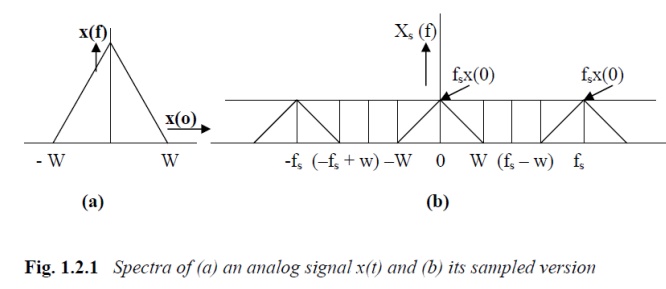Chapter: Digital Communication : Sampling & Quantization
Aliasing and signal reconstruction
Aliasing and signal
reconstruction:
Nyquist‟s
theorems as stated above and also helps to appreciate their practical
implications.
Let us
note that while writing Eq.(1.4), we assumed that x(t) is an energy signal so
that its Fourier transform exists. With this setting, if we assume that x(t)
has no appreciable frequency component greater than W Hz and if fs> 2W, then
Eq.(1.4) implies that Xs(f), the Fourier Transform of the sampled signal Xs(t)
consists of infinite number of replicas of X(f), centered at discrete
frequencies n.fs, -∞ < n < ∞ and scaled by a constant fs= 1/Ts.

Fig. 1.2.1 indicates that the bandwidth of
this instantaneously sampled wave xs(t) is infinitewhile the spectrum of x(t)
appears in a periodic manner, centered at discrete frequency values n.fs. Part
– I of the sampling theorem is about the condition fs> 2.W i.e. (fs – W)
> W and (– fs + W) < – W. As seen from Fig. 1.2.1, when this condition is
satisfied, the spectra of xs(t), centered at f = 0 and f = ± fs do not overlap
and hence, the spectrum of x(t) is present in xs(t) without any distortion.
This implies that xs(t), the appropriately sampled version of x(t), contains
all information about x(t) and thus represents x(t).
The
second part suggests a method of recovering x(t) from its sampled version xs(t)
by using an ideal lowpass filter. As indicated by dotted lines in Fig. 1.2.1,
an ideal lowpass filter (with brick-wall type response) with a bandwidth W ≤ B
< (fs – W), when fed with xs(t), will allow the portion of Xs(f), centered
at f = 0 and will reject all its replicas at f = n fs, for n ≠ 0. This implies
that the shape of the continuous time signal xs(t), will be retained at the
output of the ideal filter.
Related Topics